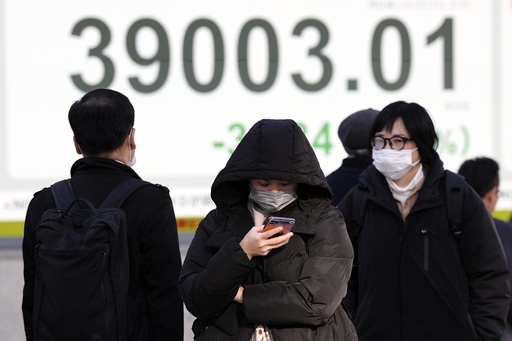
BANGKOK — On Christmas Day, stock prices dipped in both Tokyo and Shanghai, as these were among the few global markets operating on the holiday.
Oil prices experienced an increase during this time.
Japan’s Nikkei 225 index saw a slight decline of 0.1%, settling at 38,997.02, while the Shanghai Composite index fell by 0.2% to 3,387.41.
Investors are looking forward to the weekly report on U.S. unemployment benefits, scheduled for release on Thursday.
Early on Wednesday, U.S. benchmark crude oil prices rose by 93 cents to reach $70.17 a barrel, while the international standard, Brent crude, saw a modest gain of 6 cents, bringing it to $73.23 a barrel.
The value of the dollar climbed to 157.37 Japanese yen, compared to 157.11 yen previously. The euro also saw an uplift, rising to $1.0431 from $1.0397.
In a shortened trading session on Tuesday, U.S. stock markets closed positively, powered by gains in major technology companies.
The S&P 500 index gained 1.1%, the Dow Jones Industrial Average increased by 0.9%, and the Nasdaq composite rose by 1.3%.
On the New York Stock Exchange, advancing stocks outnumbered those that declined by more than three to one.
Notable increases included Broadcom with a rise of 3.2%, Apple’s 1.1% gain, and Amazon’s 1.8% increase.
Super Micro Computer experienced an impressive climb of 6%, while Tesla enjoyed the largest increase among S&P 500 stocks, soaring by 7.4%.
American Airlines rebounded from an early loss to finish with a 0.6% increase after briefly grounding flights across the country due to a technical glitch.
U.S. Steel saw a 1.9% gain a day after a significant government committee failed to reach a consensus regarding national security concerns related to a proposed $15 billion sale to Japan’s Nippon Steel.
In an extraordinary shift, NeueHealth’s stock skyrocketed by 74.9% following the announcement that the healthcare firm would be taken private in a deal worth around $1.3 billion.
The recent U.S. market rally, often referred to as the “Santa rally,” typically marks a cheerful season for stocks.
Historically, the last five trading days of the year along with the first two of the new year have produced an average gain of 1.3% since 1950.
However, this month, the U.S. stock market has given up some of its gains that followed President-elect Donald Trump’s Election Day win, which initially raised expectations for enhanced economic growth and less strict regulations favoring corporate profits.
There are mounting concerns about Trump’s focus on tariffs and various policies that may lead to increased inflation, growth in U.S. government debt, and challenges for international trade.
Nevertheless, the overall outlook for the U.S. stock market remains positive, with predictions for solid returns in 2024.
So far this year, the S&P 500 has seen a robust increase of 26.6% and is hovering about 1% beneath its recent all-time peak—one of 57 record highs achieved throughout the year.

